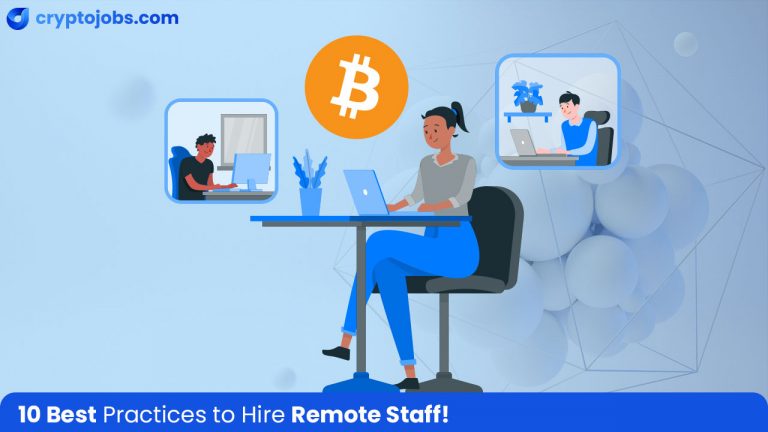
10 Best Practices to Hire Remote Employees – A Quick Overview!
- cryptojobs.com
- September 25, 2023
- All Posts, Employer’s Guide, Hiring Advice
- hiring
- 0 Comments
Are you a big company or a small startup looking to hire remote employees? Well, it doesn’t matter if you’re a big or small company, you need to set some strategies in order to attract the best candidates.
The trend of remote work has evolved into a fundamental shift in business operations. Hiring remote workers has numerous advantages. However, it’s important to establish some effective practices for integrating new members into the virtual team.
No matter how big or small your enterprise is, you can always create a cohesive and productive remote team. All you need is to follow the right practices to succeed.
To help you create an efficient remote team, we’ve compiled a list of the 10 best practices for hiring remote workers.
Check out these 10 game-changing practices for hiring remote employees!
10 Best Practices to Hire Remote Employees
- Clear Job Description
- Structured Interview Process
- Emphasis on Communication Skills
- Remote Work Experience
- Technology Proficiency
- Assessment of Self-Discipline
- Cultural Fit and Values
- Onboarding Process
- Clear Performance Metrics
- Virtual Team Building
Let’s dig into the details now!
- Clear Job Descriptions
Begin with a comprehensive job description that outlines responsibilities, expectations, and qualifications. Clearly define the role’s scope, required skills, and preferred experience. An accurate job description sets the foundation for attracting the right candidates who are aligned with your company’s requirements.
- Structured Interview Process
Create an interview process that evaluates both technical competence and remote work suitability. Incorporate various interview rounds, such as technical assessments, behavioural interviews, and virtual team discussions.
This multifaceted approach helps you understand candidates’ skills, communication abilities, and compatibility with remote work dynamics.
- Emphasis on Communication Skills
Remote work heavily relies on effective communication. During the hiring process, assess the communication skills of potential candidates, both written and verbal.
Look for individuals who can articulate ideas clearly and express themselves concisely. Moreover, they must actively listen to other teammates. For remote collaboration, these skills are extremely important for any organization.
- Remote Work Experience
Candidates with prior remote work experience are preferred. Candidates who have successfully navigated remote work in the past are more likely to adapt quickly to your remote work environment. It’s easier for them to integrate since they are familiar with the challenges and nuances of remote collaboration.
- Technology Proficiency
Remote work is enabled by technology. Therefore, candidates should be comfortable using relevant tools and software. Make sure they know how to use communication platforms, project management tools, and industry-specific software.
- Assessment of Self-Discipline
Working remotely demands a high level of self-discipline and time management. During interviews, inquire about candidates’ routines. Ask them how they stay organized and how they ensure productivity outside of a traditional office setting.
It is important to look for individuals who are able to manage their workload independently.
- Cultural Fit and Values
Company culture matters regardless of the work setting. Assess whether candidates’ values align with your company’s culture, even if they won’t be physically present in the office. Remote employees who resonate with your company’s values are more likely to stay motivated and engaged over time.
- Onboarding Process
Develop a comprehensive onboarding process that introduces new hires to your company’s culture, policies, and procedures. Provide access to training materials, online resources, and virtual introductory sessions with key team members. A well-structured onboarding process sets the stage for a successful work journey to hire remote employees.
- Clear Performance Metrics
Set clear performance metrics and expectations right from the start. Remote employees should understand how their work will be measured and what goals they’re expected to achieve. Regularly review their progress and provide constructive feedback to keep them on track.
- Virtual Team Building
Remote work doesn’t mean sacrificing team camaraderie. When aiming to hire remote employees, organize virtual team-building activities to foster connections among remote resources. These activities can range from online games and video calls to virtual coffee chats. Building personal connections enhances collaboration and creates a sense of belonging.
Bonus Tip – Provide Flexibility!
Consider incorporating flexibility into your remote work policies. It’s important to recognize that remote workers have diverse situations. Accommodating your employees’ needs can result in higher job satisfaction and productivity.
Be empathic towards the challenges they face and provide them with the support they need.
Closing Point!
Remote work is a transformative approach that requires thoughtful and tailored hiring strategies. By following these 10 best practices, you can build a remote workforce that’s not only skilled and productive but also aligned with your company’s values and culture. Each practice contributes to the creation of a cohesive and efficient workforce when looking to hire remote employees.
With these practices, you empower remote employees while also embracing the future of remote work!




